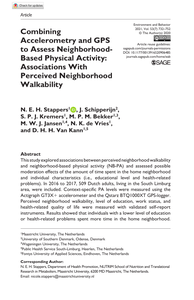Active transport to school is associated with higher levels of physical activity in children. Promotion of active transport has therefore gained attention as a potential target to increase children’s physical activity levels. Recent studies have recognized that the distance between home and school is an important predictor for active travel among children. These studies did not yet use the promising global positioning system (GPS) methods to objectively assess active transport. This study aims to explore active transport to school in relation to the distance between home and school among a sample of Dutch elementary school children, using GPS. Seventy-nine children, aged 6-11 years, were recruited in six schools that were located in five cities in the Netherlands. All children were asked to wear a GPS receiver for one week. All measurements were conducted between December 2008 and April 2009. Based on GPS recordings, the distance of the trips between home and school were calculated. In addition, the mode of transport (i.e., walking, cycling, motorized transport) was determined using the average and maximum speed of the GPS tracks. Then, proportion of walking and cycling trips to school was determined in relation to the distance between home and school. Out of all school trips that were recorded (n = 812), 79.2% were classified as active transport. On average, active commuting trips were of a distance of 422 meters with an average speed of 5.2 km/hour. The proportion of walking trips declined significantly at increased school trip distance, whereas the proportion of cycling trips (β = 1.23, p < 0.01) and motorized transport (β = 3.61, p < 0.01) increased. Almost all GPS tracks less than 300 meters were actively commuted, while of the tracks above 900 meters, more than half was passively commuted. In the current research setting, active transport between home and school was the most frequently used mode of travel. Increasing distance seems to be associated with higher levels of passive transport. These results are relevant for those involved in decisions on where to site schools and residences, as it may affect healthy behavior among children. https://doi.org/10.1186/1471-2458-14-227 LinkedIn: https://www.linkedin.com/in/sanned/
MULTIFILE

This study explored associations between perceived neighborhood walkability and neighborhood-based physical activity (NB-PA) and assessed possible moderation effects of the amount of time spent in the home neighborhood and individual characteristics (i.e., educational level and health-related problems). In 2016 to 2017, 509 Dutch adults, living in the South Limburg area, were included. Context-specific PA levels were measured using the Actigraph GT3X+ accelerometer and the Qstarz BTQ1000XT GPS-logger. Perceived neighborhood walkability, level of education, work status, and health-related quality of life were measured with validated self-report instruments. Results showed that individuals with a lower level of education or health-related problems spent more time in the home neighborhood. The perceived neighborhood walkability only affected NB-PA for individuals spending a relatively large amount of time in their home neighborhood. PA-facilitating features in the home neighborhood, for example, aesthetics, were only associated with more NB-PA for individuals without health-related problems or with a higher level of education.
DOCUMENT

Introduction: Previous longitudinal studies indicate that physical activity (PA) significantly declines from primary-to secondary school, and report both changes in individual and environmental determinants of PA. In order to understand this transition and to prevent this negative trend, it is important to gather contextually rich data on possible mechanisms that drive this decline. Therefore, the aim of this study was to investigate changes of PA patterns in transition between primary and secondary school, and to add domain-specific insights of how, where, and when these changes occur. Methods: In total, 175 children participated in a 7-day accelerometer- and Global Positioning System (GPS) protocol at their last year of primary and their first year of secondary school. GPS data-points were overlaid with Geographical Information Systems (GIS) data using ArcGIS 10.1 software. Based on the GPS locations of individual data-points, we identified child’s PA at home, school, local sports grounds, shopping centers, and other locations. Also, trips in active and passive transport were identified according to previously validated GPS speed-algorithms. Longitudinal multi-level linear mixed models were fitted adjusting for age, gender, meteorological circumstances, and the nested structure of days within children and children within schools. Outcome measures were minutes spent in light PA and moderate-to-vigorous PA, specified for the time-segments before school, during school, after school and weekend days. Results: Total PA significantly declined from primary to secondary school. Although transport-related PA increased before- and during school, decreases were found for especially afterschool time spent at sports grounds and transport-related PA during weekends.
MULTIFILE
